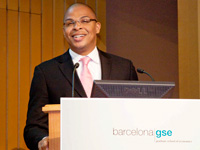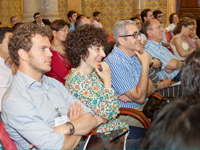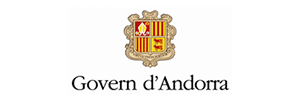community
Roland Fryer (Harvard) receives 2nd Calvó-Armengol International Prize

The second Calvó-Armengol International Prize in Economics was awarded to Harvard’s Prof. Roland Fryer on June 2, 2012 at a ceremony in Andorra, the homeland of the Prize's namesake Prof. Antoni Calvó-Armengol (UAB and BSE). The Calvó Prize is awarded every two years to a top researcher in economics or social sciences younger than 40 years old for his or her contribution to the theory and comprehension of the mechanisms of social interaction.
Presiding over the award ceremony were authorities from the three entities that organize the Calvó Prize: Hon. Mr. Antoni Martí, Prime Minister of Andorra; Mr. Josep Peralba, CEO of Crèdit Andorrà; and Dr. Eduard Vallory, Director-General of the Barcelona School of Economics.
“With this Prize, we recognize the work of people like Toni, who would use their knowledge to build a better world,” Mr. Martí said at the ceremony.
The Prize committee, chaired by Prof. Matthew Jackson (Stanford University) and also formed by Prof. Joel Sobel (UC-San Diego), and Prof. Salvador Barberà (UAB and BSE), chose to award the Calvó Prize to Prof. Fryer for his contributions to the study of inequality in education due to racial segregation. Prof. Fryer has been an energetic and entrepreneurial researcher analyzing race and inequality using a diverse set of theoretical, empirical, and experimental tools to shed new light on the role of race in social interactions.
In addition to the formal prize ceremony, Prof. Fryer delivered the Calvó Prize Lecture, “Racial Inequality in the 21st Century: The Declining Significance of Discrimination” and led a workshop on “Advances in Social Economics: Theory and Applications” as part of the Prize activities. Both events took place at Casa Convalescència in Barcelona.
Solving the education equation: the racial achievement gap
In his Calvó Prize Lecture, Prof. Fryer presented several experimental education interventions that he and his research team have attempted to implement in underperforming U.S. schools with predominantly black and Hispanic populations.
“The magnitude of racial differences in educational achievement is startling,” Prof. Fryer said. Data shows that “accounting for educational achievement drastically reduces racial and socioeconomic inequality across a wide range of important life outcomes.”
In addition to the personal impact that the achievement gap has on individuals, Prof. Fryer observed that all of these outcomes taken together have an enormous impact on the United States economy, costing trillions of dollars in lost GDP and international competitiveness over the years. While some of Prof. Fryer’s experiments, such as paying students cash incentives for academic efforts, did not seem successful, others, such as extending the school day by an hour, have been shown to narrow the racial achievement gap.
“There are no excuses for why we can’t do this work,” Prof. Fryer told the lecture audience. “The model is far from perfect, but it’s enough to get started.”
Latest research in social economics
The Calvó Prize Workshop, organized by Prof. Fryer with the secretary of the Prize, Prof. Guillaume Haeringer (UAB and BSE) included presentations by young researchers in social economics from institutions around the world including University of Chicago, Bocconi University, Australian School of Business, and London School of Economics, among others. Topics ranged from a macroeconomic model of the stigma associated with premarital sex (Prof. Nezih Guner, UAB and BSE) to “Prisons as a School of Crime: Evidence from Cell-Level Interactions” (Prof. Glenn C. Loury, Brown University).

Prof. Roland Fryer (Harvard University) delivers the Calvó Lecture in Barcelona.

Members of the BSE faculty and student body attend the lecture at Casa Convalescència in Barcelona.
About Roland Fryer's Research
Time Magazine 100 Most Influential People of 2009
The New York Times Magazine feature from March 2005



